外研版(2019) 选择性必修 第四册Unit 1 Looking forwards Section Ⅱ Using language课件(共57张PPT)
文档属性
| 名称 | 外研版(2019) 选择性必修 第四册Unit 1 Looking forwards Section Ⅱ Using language课件(共57张PPT) | 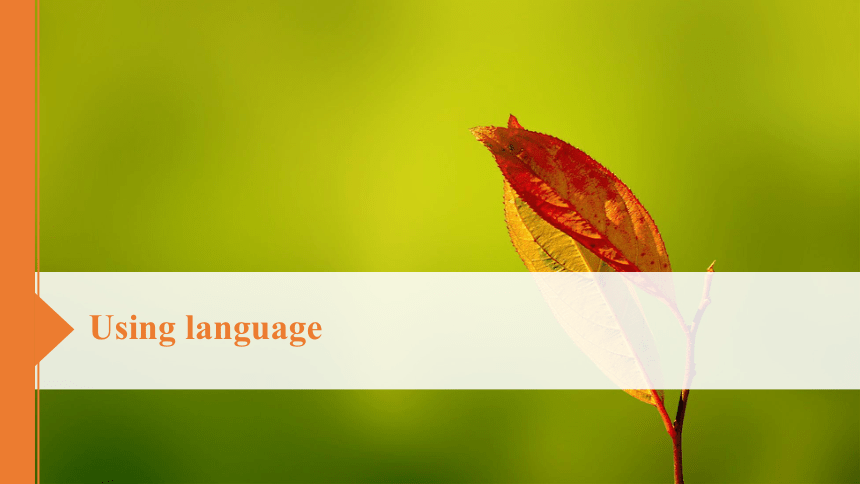 | |
| 格式 | pptx | ||
| 文件大小 | 2.4MB | ||
| 资源类型 | 教案 | ||
| 版本资源 | 外研版(2019) | ||
| 科目 | 英语 | ||
| 更新时间 | 2023-05-24 19:09:51 | ||
图片预览

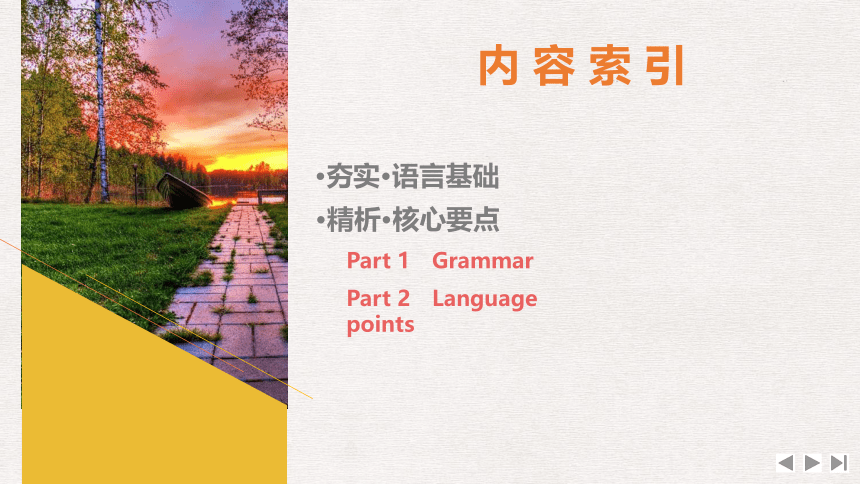
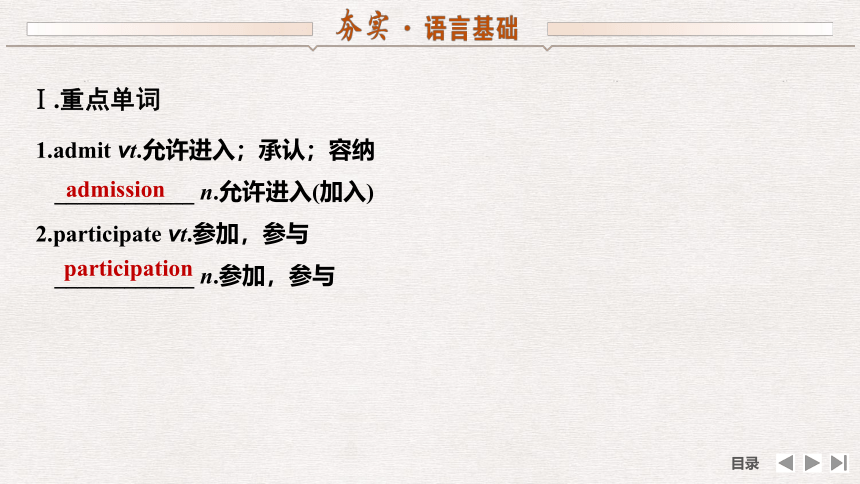
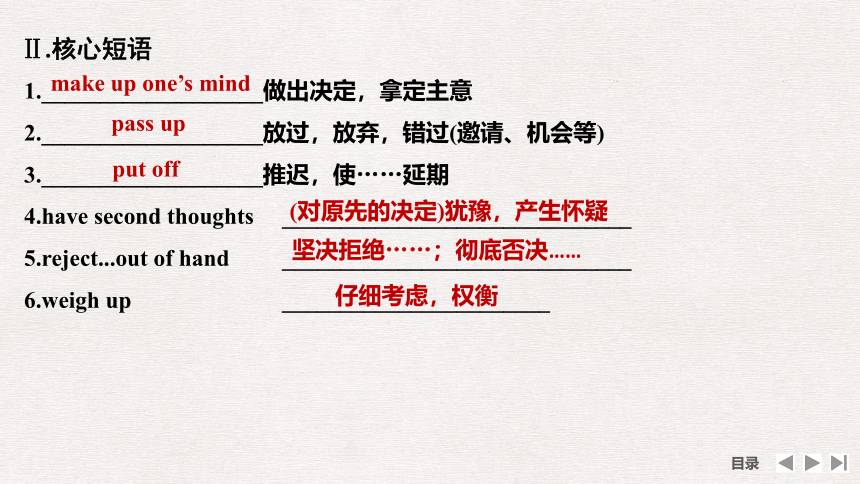
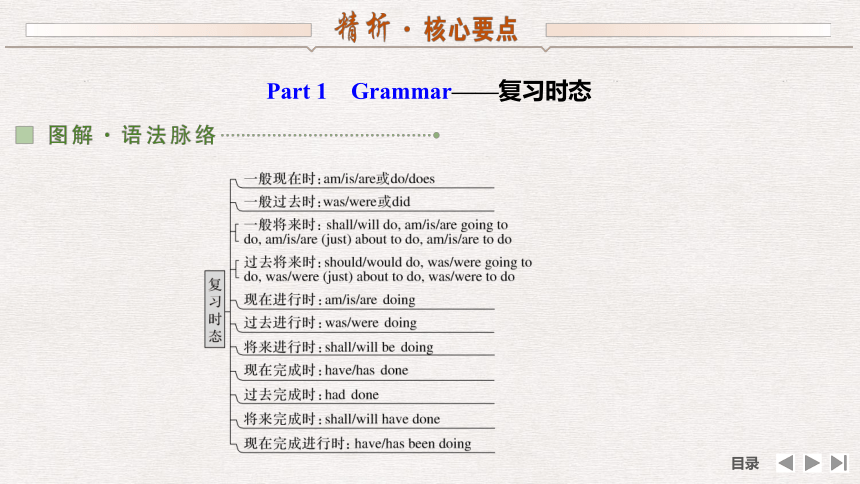
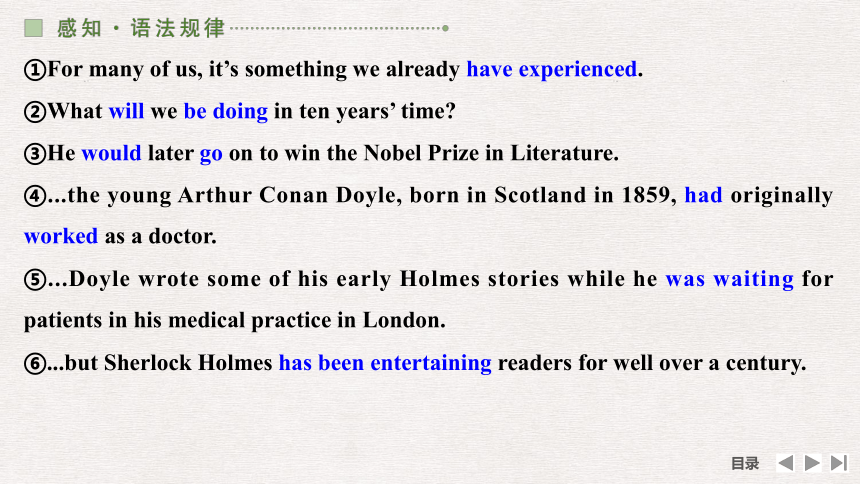
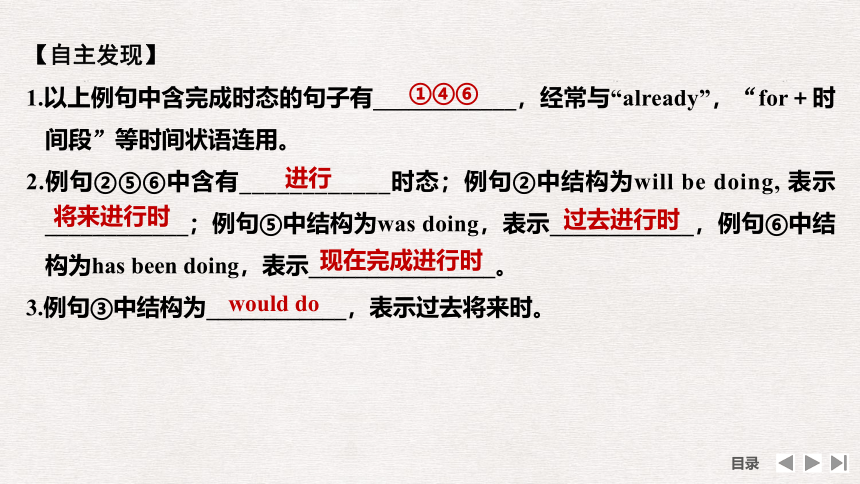

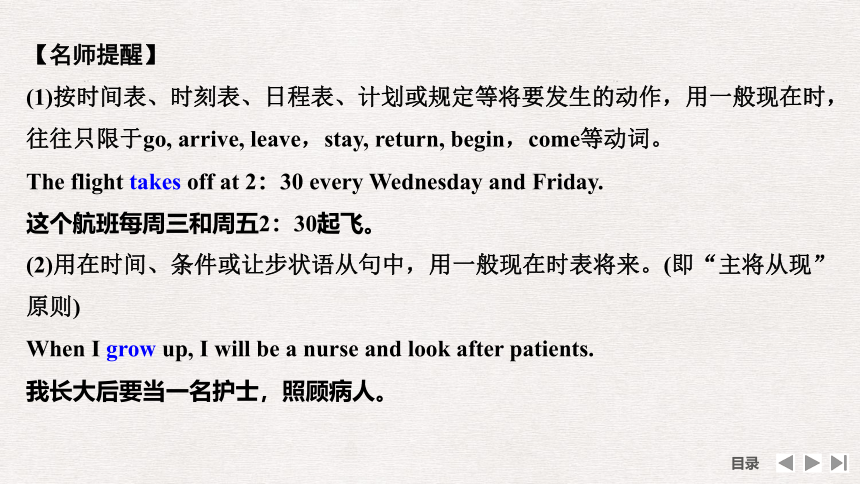
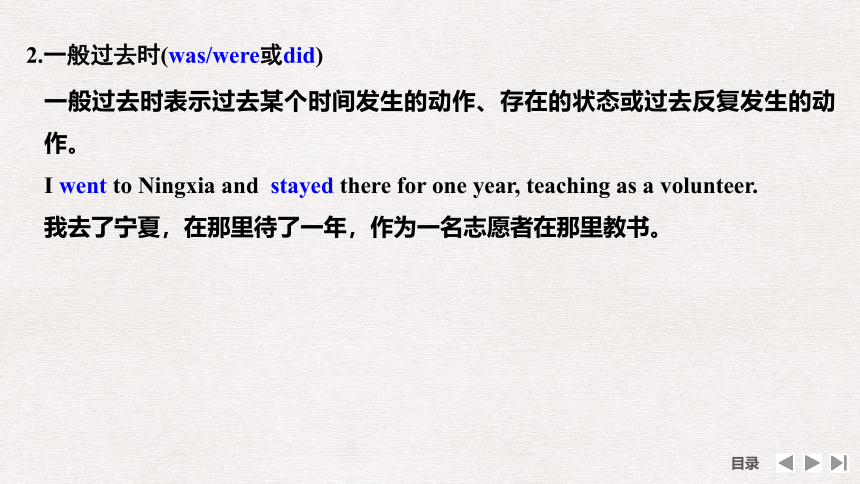
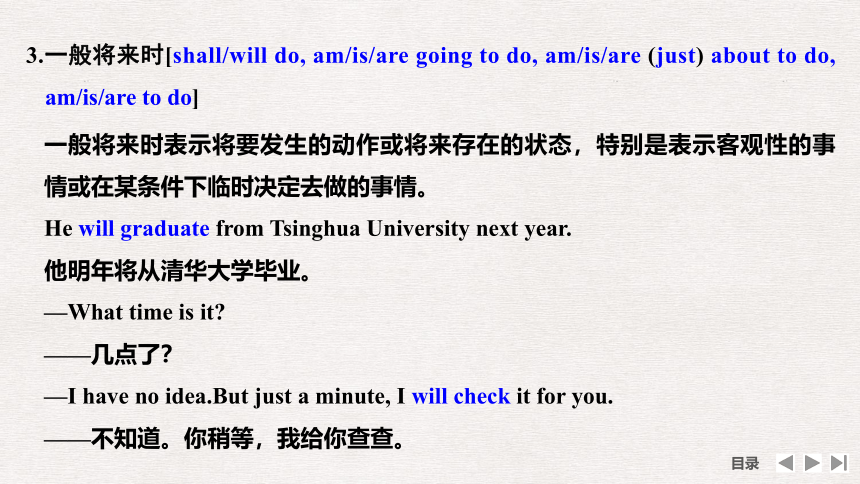
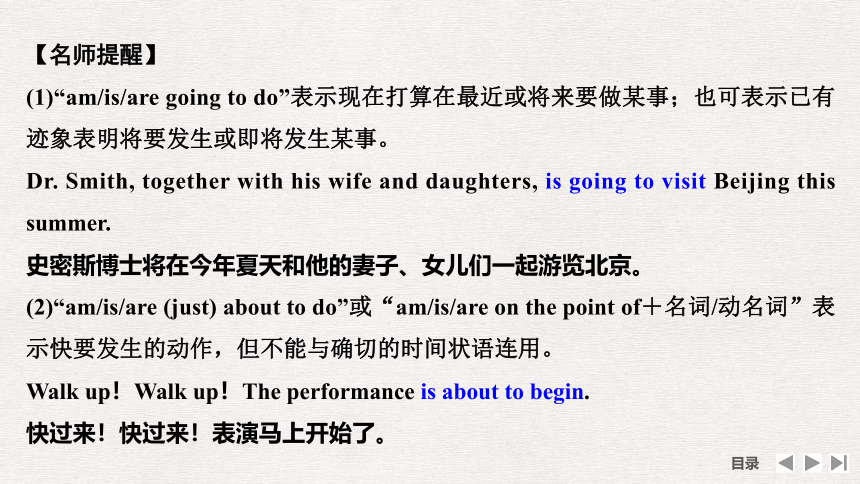
文档简介
(共57张PPT)
Using language
内 容 索 引
·夯实·语言基础
Part 1 Grammar
Part 2 Language points
·精析·核心要点
Ⅰ.重点单词
admission
1.admit vt.允许进入;承认;容纳
____________ n.允许进入(加入)
2.participate vt.参加,参与
____________ n.参加,参与
participation
Ⅱ.核心短语
make up one’s mind
1.___________________做出决定,拿定主意
2.___________________放过,放弃,错过(邀请、机会等)
3.___________________推迟,使……延期
4.have second thoughts ______________________________
5.reject...out of hand ______________________________
6.weigh up _______________________
pass up
put off
(对原先的决定)犹豫,产生怀疑
坚决拒绝……;彻底否决……
仔细考虑,权衡
Part 1 Grammar——复习时态
①For many of us, it’s something we already have experienced.
②What will we be doing in ten years’ time
③He would later go on to win the Nobel Prize in Literature.
④...the young Arthur Conan Doyle, born in Scotland in 1859, had originally worked as a doctor.
⑤...Doyle wrote some of his early Holmes stories while he was waiting for patients in his medical practice in London.
⑥...but Sherlock Holmes has been entertaining readers for well over a century.
【自主发现】
1.以上例句中含完成时态的句子有____________,经常与“already”,“for+时间段”等时间状语连用。
2.例句②⑤⑥中含有____________时态;例句②中结构为will be doing, 表示____________;例句⑤中结构为was doing,表示____________,例句⑥中结构为has been doing,表示________________。
3.例句③中结构为____________,表示过去将来时。
①④⑥
进行
将来进行时
过去进行时
现在完成进行时
would do
一、一般时态
1.一般现在时(am/is/are或do/does)
一般现在时表示经常发生的或习惯性动作、客观存在的情况或状态等。常与表示时间或频度的状语连用,如: always, often, seldom, sometimes, usually, every day/night, every time, now and then等。
Around two o’clock every night, Sue starts talking in her dream.It somewhat bothers us.
每天晚上大约两点钟的时候,休就开始说梦话。这有点困扰我们。
【名师提醒】
(1)按时间表、时刻表、日程表、计划或规定等将要发生的动作,用一般现在时,往往只限于go, arrive, leave,stay, return, begin,come等动词。
The flight takes off at 2:30 every Wednesday and Friday.
这个航班每周三和周五2:30起飞。
(2)用在时间、条件或让步状语从句中,用一般现在时表将来。(即“主将从现”原则)
When I grow up, I will be a nurse and look after patients.
我长大后要当一名护士,照顾病人。
2.一般过去时(was/were或did)
一般过去时表示过去某个时间发生的动作、存在的状态或过去反复发生的动作。
I went to Ningxia and stayed there for one year, teaching as a volunteer.
我去了宁夏,在那里待了一年,作为一名志愿者在那里教书。
3.一般将来时[shall/will do, am/is/are going to do, am/is/are (just) about to do, am/is/are to do]
一般将来时表示将要发生的动作或将来存在的状态,特别是表示客观性的事情或在某条件下临时决定去做的事情。
He will graduate from Tsinghua University next year.
他明年将从清华大学毕业。
—What time is it
——几点了?
—I have no idea.But just a minute, I will check it for you.
——不知道。你稍等,我给你查查。
【名师提醒】
(1)“am/is/are going to do”表示现在打算在最近或将来要做某事;也可表示已有迹象表明将要发生或即将发生某事。
Dr. Smith, together with his wife and daughters, is going to visit Beijing this summer.
史密斯博士将在今年夏天和他的妻子、女儿们一起游览北京。
(2)“am/is/are (just) about to do”或“am/is/are on the point of+名词/动名词”表示快要发生的动作,但不能与确切的时间状语连用。
Walk up!Walk up!The performance is about to begin.
快过来!快过来!表演马上开始了。
(3)“am/is/are to do”表示按计划或安排即将发生的动作;也可表示职责、义务、意图、约定、禁止、可能性等。
The lecture is to be delivered at the hall.
讲座将在大厅举办。
4.过去将来时[should/would do, was/were going to do, was/were (just) about to do, was/were to do]
过去将来时的出发点是过去,即从过去某一时刻看以后要发生的动作或状态;也可用来表示过去某种习惯性行为。
Our father said that he would wait for us at the bus stop.
爸爸说他会在公交车站等我们。
Whenever we had trouble, he would come to help us.
每当我们遇到困难时,他总会来帮助我们。
①The 80,000 objects collected by Sir Hans Sloane, for example, ____________ (form)the core collection of the British Museum which opened in 1759.(2020·新高考卷Ⅰ)
②Often,only a small part of a museum’s collection ____________ (be)on display.Most of it is stored away or used for research.(2020·新高考卷Ⅰ)
③If you look at all sides of the situation, you’ll find probably a solution that ____________(suit)everyone.(2020·江苏卷单选)
单句语法填空
formed
is
suits
④The amazing thing about the spring is that the colder the temperature ________(get), the hotter the spring!(2021·新高考卷Ⅰ)
⑤When I returned to London in 2004,I ____________ (find) myself wandering down to Southbank,spending hours there.(2021·全国甲卷)
⑥After Lincoln was elected President of the US in 1861, they rented the house and ____________ (sell)most of their furniture.(2021·浙江6月卷)
⑦The weather forecast says it ________ (be) cloudy with a slight chance of rain later tonight.(天津卷单选)
gets
found
sold
will be
二、进行时态
1.现在进行时(am/is/are doing)
现在进行时表示说话时正在进行或现阶段正在进行的动作或发生的事,经常与now, at the moment,these days等连用。
Linda’ s brother is watching TV in his bedroom now.
现在琳达的哥哥正在他的卧室里看电视。
【名师提醒】
(1)现在进行时可以表示按计划或安排即将发生的动作,常限于go,come, leave, start, arrive, return,work, sleep,stay,have,wear等动词。
We’re having some guests tonight.
我们今晚有客人来。
(2)当现在进行时与频度副词always, forever, continually, constantly等连用时强调重复的动作,表示某种感彩(如赞许、厌烦、满意等)。
My wife is always complaining about this or that.
我的妻子总是抱怨这个那个的。
The students are making progress constantly. 学生们在不断进步。
2.过去进行时(was/were doing)
过去进行时表示过去某一时刻正在进行或某一段时间内持续进行的动作,常和then,at that time,at this time last night,the whole night,those days,from one to five yesterday等时间状语连用,表示过去某时正在进行的状态或动作。
What were you doing at this time last week
上周这个时候你在干什么?
【名师提醒】
(1)表示位移的动词,如come,go, arrive,leave,start, begin, return等的过去进行时,可以表示计划、安排过去将要发生的动作。
She told me that she was going to Hainan for her holiday.
她告诉我她将去海南度假。
(2)过去进行时在含有时间状语从句的复合句中,表示一个过去的动作发生时或发生之后,另一个动作正在进行。
When I got to the top of the mountain, the sun was shining.
我到达山顶时,阳光灿烂。
3.将来进行时(shall/will be doing)
将来进行时表示将来某一时刻或某一阶段内将要发生的动作。
The train will start at 9 o’clock, so she will be leaving at about seven.
火车在9点钟出发,因此她将在7点钟离开。
Be sure to come, and we will be expecting you.
一定要来,我们会等着你的。
【名师提醒】 将来进行时还可表示将来某一段时间内持续发生的动作。
He will be working as a volunteer in the club during the summer vacation.
暑假期间他将在俱乐部担任志愿者。
Attracted by the beautiful scenery, I shall be staying here for about a week.
由于被美丽的景色所吸引,我将在这里住一星期左右。
①The first time I saw him,he ____________(fight) with a big boy.
②At this time tomorrow,I ____________(lie) on the beach.
③I’ll go to the library as soon as I finish what I ____________(do).
单句语法填空
was fighting
will be lying
am doing
三、完成时态
1.现在完成时(have/has done)
(1)表示结束、结果
现在完成时表示一个过去发生并结束的动作对现在产生的影响。这一类情况可以细分为下述两种情况:表示开始于过去的动作刚刚结束,常和already,just, yet,not...yet等连用;表示过去动作的结果,现在仍残留着,一般不用时间状语。
I have just turned off the computer. 我刚刚把电脑关了。
China has become the first country to land a spacecraft on the far side of the moon.(2020·全国卷Ⅰ) 中国已经成为第一个将航天器降落在月球背面的国家。
(2)表示继续
表示过去已经开始,持续到现在,仍要继续下去的动作或状态,往往和表示一段时间包括现在时间在内的状语连用,如today, lately, recently, these days, in the last/past few years,“for+时间段”,“since+时间点”。
The couple have lived there for over twenty years.
这对夫妇已经在那里居住20多年了。
China’s high-speed railways have grown from 9,000 to 25,000 kilometers in the past few years.(北京卷)
在过去的几年中,中国的高速铁路已经从9 000千米增加到25 000千米。
(3)表示经历和经验
表示从过去到现在之间经历过的事情,常和often, never, ever, before,since等连用。
I have never been so annoyed in all my life!
我这一生从没有这样恼火过!
【名师提醒】 现在完成时态的常用固定句型:
①在“That/This/It is the first/second/third/...time that...”句型中,从句要用现在完成时。
This is the first time that I have watched a thrilling movie. 这是我第一次看恐怖电影。
②在“That/This/It is the+形容词的最高级+名词+that...”句型中,从句用现在完成时。
This is the best book that I have ever read.
这是我所看过的最好的书。
③在“It+has been+一段时间+since...”句型中,主句常用现在完成时(也可以用一般现在时)。
It is/has been ten years since I graduated from university.
我大学毕业已经十年了。
2.过去完成时(had done)
(1)过去完成时表示在过去某一时刻或动作以前完成了的动作,即“过去的过去”。可以用“by...”,“before...”等介词短语或一个时间状语从句来表示,也可以用一个表示过去的动作来表示,还可以通过上下文来表示。
When I woke up,it had already stopped raining.
我醒来时雨已经停了。
(2)过去完成时表示由过去的某一时刻开始,一直延续到过去另一时间的动作或状态,常和for,since构成的时间状语连用。
He had served in the army for ten years before he retired last year.
他在部队服役了十年,去年退役了。
(3)有些动词如hope,wish,expect,think,intend,mean,suppose等,用过去完成时表示“原来打算做而未做的事”。
He had planned to go abroad,but he changed his mind after finding a good job.
他本来打算出国,但找到一份好工作之后又改变了主意。
(4)过去完成时用于某些固定句型中,如:It was the first/second/third/...time that sb had done...;hardly/scarcely...when...;no sooner...than...等。
It was the first time that I had left home.
这是我第一次离开家。
No sooner had we reached the station than the train was off.
我们一到车站,火车就开了。
3.将来完成时(shall/will have done)
将来完成时表示将来某时之前或某动作之前已经完成的动作,或一个持续到将来某时或某动作发生之前的动作。
I shall have finished the report by next Friday.
到下周五我就完成这份报告了。
By next Monday, she will have studied here for three years.
到下周一,她在这里学习就要满三年了。
①I ____________ (hope)to send Peter a gift to congratulate him on his marriage, but I couldn’t manage it.(2019·天津卷单选)
②Hopefully in 2025 we will no longer be e-mailing each other, for we ____________________ (develop) more convenient electronic communication tools by then.(江苏卷单选)
单句语法填空
had hoped
will have developed
四、现在完成进行时(have/has been doing)
I have been reading this book for two weeks.
这两周我一直在读这本书。
1.现在完成进行时表示过去开始到现在(没有停止)且还将继续进行下去的动作,一般翻译成: 一直做某事,常与all this time,this week,this month,all night,all the morning,recently等状语以及“since+时间点”,“for+时间段”等时间状语连用。
2.表示在一段持续的时间内动作的多次重复,而这个重复的动作在说话时并不一定在进行。
They have been discussing the matter several times this year.
他们今年已经数次讨论那件事了。
3.表示强烈的感彩。
Who’s been eating my apples
谁老是在吃我的苹果?
【名师提醒】 现在完成时与现在完成进行时辨析
时态 基本语法功能 动作的反复 感彩
现在完成时 强调动作对现在的影响或产生的后果 不表示动作的反复 一般不含有感彩
现在完成进行时 强调动作的持续性 可表示动作的反复 可表示强烈的感彩
We have cleaned the classroom.(已经完成)
我们把教室打扫过了。
We have been cleaning the classroom.(尚未完成)
我们一直在打扫教室。
Have you met her lately?(不强调动作反复)
你最近跟她见过面吗?
Have you been meeting her lately?(强调动作反复)
你最近总跟她见面吗?
We have looked for him,but haven’t found him.(无感彩)
我们找过他,但没有找到他。
Where have you been We have been looking for you everywhere.(表示不满的感彩)
你到哪里去了?我们到处在找你。
①—You are a great swimmer.
—Thanks.It’s because I ____________________ (practise)a lot these days.(2020·天津卷单选)
②Dashan,who ________________ (learn)crosstalk, the Chinese comedic tradition, for decades, wants to mix it up with the Western stand-up tradition.(江苏卷)
单句语法填空
have been practising
has been learning
1. admission n.允许进入(加入);录取;承认,招认;入场费,门票费
I’ve been recommended for admission to study physics at my dream university.(教材P6)
我被推荐进入我梦想的大学学习物理。
Part 2 Language points——析考点
(1)admission to... 允许加入/进入……
(2)admit v.允许进入;承认;容纳
admit (doing/having done) sth 承认(做了)某事
admit sb/sth to be... 承认某人/某事是……
admit (to sb) that... (向某人)承认……
admit...to/into... 允许……加入/进入……
She failed to gain admission to the university of her choice.
她没被自己选择的大学录取。
Thanks to his diligence and hard work, he was finally admitted ____________ a key university.
多亏了他的勤奋和努力,他最终被一所重点大学录取。
All the staff in the company admit him ________ (be) the perfect one for the job.
公司里所有的员工都承认他是这项工作的最佳人选。
She said sorry to me and admitted ____________________(take) my umbrella by mistake. 她向我道歉,承认错拿了我的伞。
to/into
to be
taking/having taken
2. participation n.参加,参与
In addition to participation in school,a part-time job—such as working in a café or in an office administration role—can also be helpful in this transition.(教材P7)
除了上学,兼职工作比如咖啡馆的工作或办公室管理工作,也可以在这一过渡中有所帮助。
(1)participation in 参与……
(2)participate v.参加,参与
participate in=take part in 参加,参与
(3)participant n.参与者,参加者
A leg injury is preventing him from participation/participating in the competition.
腿部受伤使他不能参加比赛。
Many citizens ____________ in the anti-smoking campaign and most of the ____________ said their ____________ was voluntary.(participate)
许多市民都参加了反对吸烟的运动,大多数参与者说他们的参与是自愿的。
participated
participants
participation
[链接写作] 一句多译
上周末,我和同学们参加了一个农场的采摘活动。(2020·全国卷Ⅱ满分作文)
→My classmates and I _________________________________on a farm last weekend.
→My classmates and I ___________________________________ on a farm last weekend.
took part in a picking activity
participated in a picking activity
3. make up one’s mind 做出决定,拿定主意
I can’t make up my mind what the right thing to do is.(教材P6)
我无法决定做什么事情是正确的。
make up one’s mind to do sth 决定做某事
change one’s mind 改变主意
keep/bear...in mind 记住……
fix one’s mind on/upon... 把注意力集中在……
Encouraged by my parents, I made up my mind to study harder.
在父母的鼓励下,我下定决心更加努力学习。
Always bear/keep ____________ mind that your task is to get this company running well.
要一直记住:你的任务是使这家公司运转顺利。
He fixed his mind ____________ his work and didn’t notice us coming into the office.
他一心一意地工作,没有注意到我们进了办公室。
in
on/upon
【巧学助记】 When I made up my mind to become an artist, everyone said I was crazy.Whatever they said, I would not change my mind, because that was my lifelong goal.My father said, “Once you have set up a goal, just go for it.”I always keep that in mind and will not forget that in any case.
当我下定决心要成为一名艺术家时,每个人都说我疯了。无论他们说什么,我都不会改变主意,因为那是我毕生的目标。我的父亲说过:“一旦你设定了一个目标,就只管为之努力。”我一直记得父亲的这句话,并且在任何情况下都不会忘记。
4. pass up 放过,放弃,错过(邀请、机会等)
I think it would be a great pity to pass up the opportunity to be admitted without taking the exam.(教材P6)
我认为没有参加考试错过了被录取的机会是非常遗憾的。
pass away 去世
pass by 经过(……旁边);通过
pass down 使世代相传;流传
pass out 昏迷,失去知觉
pass sth on(to sb) 把某物转交(给某人);(用后)递给,传给(某人)
I don’ t think you should pass up the opportunity to go to university.
我认为你不应该错过上大学的机会。
I saw him drawing the picture when I passed ____________ his room.
当我经过他的房间时,我看见他正在画画。
Unfortunately, the scientist passed ____________, which was a great loss to our country. 不幸的是,这位科学家去世了,这是我们国家的巨大损失。
by
away
[链接写作] 完成句子
The traditional craft ______________________from generation to generation.
这种传统工艺是一代一代传下来的。
has been passed down
5.put off 推迟,使……延期
Can you put off making a decision until you’ve spoken to your high school advisor?(教材P6) 你能不能推迟做决定直到你和你的高中导师谈一下?
put forward 提出(意见,建议)
put aside 节省;储蓄;储存;留出;放一边
put away 放好;存起来
put down 记下,写下;镇压;付(定金)
put on 表演,上演;穿上,戴上
put out 扑灭;伸出
put up 建造;张贴;提高;留宿
The sports meeting has been put off because of the heavy rain.
运动会因为大雨而已经被延期了。
Ten minutes later,the firefighters arrived and the big fire ____________(put) out. 十分钟后,消防队员赶到了,大火被扑灭了。
The manager put ____________ a suggestion that we should have an assistant.
经理提出了我们应该有一个助手的建议。
[链接写作] 完成句子
The theatrical troupe is hoping to ____________ before the end of the year.
那个剧团希望年底之前上演一部话剧。
was put
forward
put on a play
6. weigh up 仔细考虑,权衡
Then we can weigh up the options and try to come to a decision.(教材P6)
然后我们可以权衡各种选择,并努力做出决定。
(1)weigh down 压弯,压下,压倒;使某人感到沉重
(2)weight n.重;重量;体重
lose weight 减肥
put on/gain weight 增加体重
watch one’s weight 控制体重
I’m trying to weigh up the advantages and disadvantages of working from home.
我正在努力权衡在家工作的利弊。
These nests increase in size each year,and can eventually weigh ____________ the branches.
这些巢穴每年都在增大,最终可能会把树枝压弯。
[链接写作] 完成句子
It’s easy to __________________, but it is quite difficult to ____________.
增加体重容易,但是减肥就困难了。
down
put on/gain weight
lose weight
Thanks!
本课时内容结束
Using language
内 容 索 引
·夯实·语言基础
Part 1 Grammar
Part 2 Language points
·精析·核心要点
Ⅰ.重点单词
admission
1.admit vt.允许进入;承认;容纳
____________ n.允许进入(加入)
2.participate vt.参加,参与
____________ n.参加,参与
participation
Ⅱ.核心短语
make up one’s mind
1.___________________做出决定,拿定主意
2.___________________放过,放弃,错过(邀请、机会等)
3.___________________推迟,使……延期
4.have second thoughts ______________________________
5.reject...out of hand ______________________________
6.weigh up _______________________
pass up
put off
(对原先的决定)犹豫,产生怀疑
坚决拒绝……;彻底否决……
仔细考虑,权衡
Part 1 Grammar——复习时态
①For many of us, it’s something we already have experienced.
②What will we be doing in ten years’ time
③He would later go on to win the Nobel Prize in Literature.
④...the young Arthur Conan Doyle, born in Scotland in 1859, had originally worked as a doctor.
⑤...Doyle wrote some of his early Holmes stories while he was waiting for patients in his medical practice in London.
⑥...but Sherlock Holmes has been entertaining readers for well over a century.
【自主发现】
1.以上例句中含完成时态的句子有____________,经常与“already”,“for+时间段”等时间状语连用。
2.例句②⑤⑥中含有____________时态;例句②中结构为will be doing, 表示____________;例句⑤中结构为was doing,表示____________,例句⑥中结构为has been doing,表示________________。
3.例句③中结构为____________,表示过去将来时。
①④⑥
进行
将来进行时
过去进行时
现在完成进行时
would do
一、一般时态
1.一般现在时(am/is/are或do/does)
一般现在时表示经常发生的或习惯性动作、客观存在的情况或状态等。常与表示时间或频度的状语连用,如: always, often, seldom, sometimes, usually, every day/night, every time, now and then等。
Around two o’clock every night, Sue starts talking in her dream.It somewhat bothers us.
每天晚上大约两点钟的时候,休就开始说梦话。这有点困扰我们。
【名师提醒】
(1)按时间表、时刻表、日程表、计划或规定等将要发生的动作,用一般现在时,往往只限于go, arrive, leave,stay, return, begin,come等动词。
The flight takes off at 2:30 every Wednesday and Friday.
这个航班每周三和周五2:30起飞。
(2)用在时间、条件或让步状语从句中,用一般现在时表将来。(即“主将从现”原则)
When I grow up, I will be a nurse and look after patients.
我长大后要当一名护士,照顾病人。
2.一般过去时(was/were或did)
一般过去时表示过去某个时间发生的动作、存在的状态或过去反复发生的动作。
I went to Ningxia and stayed there for one year, teaching as a volunteer.
我去了宁夏,在那里待了一年,作为一名志愿者在那里教书。
3.一般将来时[shall/will do, am/is/are going to do, am/is/are (just) about to do, am/is/are to do]
一般将来时表示将要发生的动作或将来存在的状态,特别是表示客观性的事情或在某条件下临时决定去做的事情。
He will graduate from Tsinghua University next year.
他明年将从清华大学毕业。
—What time is it
——几点了?
—I have no idea.But just a minute, I will check it for you.
——不知道。你稍等,我给你查查。
【名师提醒】
(1)“am/is/are going to do”表示现在打算在最近或将来要做某事;也可表示已有迹象表明将要发生或即将发生某事。
Dr. Smith, together with his wife and daughters, is going to visit Beijing this summer.
史密斯博士将在今年夏天和他的妻子、女儿们一起游览北京。
(2)“am/is/are (just) about to do”或“am/is/are on the point of+名词/动名词”表示快要发生的动作,但不能与确切的时间状语连用。
Walk up!Walk up!The performance is about to begin.
快过来!快过来!表演马上开始了。
(3)“am/is/are to do”表示按计划或安排即将发生的动作;也可表示职责、义务、意图、约定、禁止、可能性等。
The lecture is to be delivered at the hall.
讲座将在大厅举办。
4.过去将来时[should/would do, was/were going to do, was/were (just) about to do, was/were to do]
过去将来时的出发点是过去,即从过去某一时刻看以后要发生的动作或状态;也可用来表示过去某种习惯性行为。
Our father said that he would wait for us at the bus stop.
爸爸说他会在公交车站等我们。
Whenever we had trouble, he would come to help us.
每当我们遇到困难时,他总会来帮助我们。
①The 80,000 objects collected by Sir Hans Sloane, for example, ____________ (form)the core collection of the British Museum which opened in 1759.(2020·新高考卷Ⅰ)
②Often,only a small part of a museum’s collection ____________ (be)on display.Most of it is stored away or used for research.(2020·新高考卷Ⅰ)
③If you look at all sides of the situation, you’ll find probably a solution that ____________(suit)everyone.(2020·江苏卷单选)
单句语法填空
formed
is
suits
④The amazing thing about the spring is that the colder the temperature ________(get), the hotter the spring!(2021·新高考卷Ⅰ)
⑤When I returned to London in 2004,I ____________ (find) myself wandering down to Southbank,spending hours there.(2021·全国甲卷)
⑥After Lincoln was elected President of the US in 1861, they rented the house and ____________ (sell)most of their furniture.(2021·浙江6月卷)
⑦The weather forecast says it ________ (be) cloudy with a slight chance of rain later tonight.(天津卷单选)
gets
found
sold
will be
二、进行时态
1.现在进行时(am/is/are doing)
现在进行时表示说话时正在进行或现阶段正在进行的动作或发生的事,经常与now, at the moment,these days等连用。
Linda’ s brother is watching TV in his bedroom now.
现在琳达的哥哥正在他的卧室里看电视。
【名师提醒】
(1)现在进行时可以表示按计划或安排即将发生的动作,常限于go,come, leave, start, arrive, return,work, sleep,stay,have,wear等动词。
We’re having some guests tonight.
我们今晚有客人来。
(2)当现在进行时与频度副词always, forever, continually, constantly等连用时强调重复的动作,表示某种感彩(如赞许、厌烦、满意等)。
My wife is always complaining about this or that.
我的妻子总是抱怨这个那个的。
The students are making progress constantly. 学生们在不断进步。
2.过去进行时(was/were doing)
过去进行时表示过去某一时刻正在进行或某一段时间内持续进行的动作,常和then,at that time,at this time last night,the whole night,those days,from one to five yesterday等时间状语连用,表示过去某时正在进行的状态或动作。
What were you doing at this time last week
上周这个时候你在干什么?
【名师提醒】
(1)表示位移的动词,如come,go, arrive,leave,start, begin, return等的过去进行时,可以表示计划、安排过去将要发生的动作。
She told me that she was going to Hainan for her holiday.
她告诉我她将去海南度假。
(2)过去进行时在含有时间状语从句的复合句中,表示一个过去的动作发生时或发生之后,另一个动作正在进行。
When I got to the top of the mountain, the sun was shining.
我到达山顶时,阳光灿烂。
3.将来进行时(shall/will be doing)
将来进行时表示将来某一时刻或某一阶段内将要发生的动作。
The train will start at 9 o’clock, so she will be leaving at about seven.
火车在9点钟出发,因此她将在7点钟离开。
Be sure to come, and we will be expecting you.
一定要来,我们会等着你的。
【名师提醒】 将来进行时还可表示将来某一段时间内持续发生的动作。
He will be working as a volunteer in the club during the summer vacation.
暑假期间他将在俱乐部担任志愿者。
Attracted by the beautiful scenery, I shall be staying here for about a week.
由于被美丽的景色所吸引,我将在这里住一星期左右。
①The first time I saw him,he ____________(fight) with a big boy.
②At this time tomorrow,I ____________(lie) on the beach.
③I’ll go to the library as soon as I finish what I ____________(do).
单句语法填空
was fighting
will be lying
am doing
三、完成时态
1.现在完成时(have/has done)
(1)表示结束、结果
现在完成时表示一个过去发生并结束的动作对现在产生的影响。这一类情况可以细分为下述两种情况:表示开始于过去的动作刚刚结束,常和already,just, yet,not...yet等连用;表示过去动作的结果,现在仍残留着,一般不用时间状语。
I have just turned off the computer. 我刚刚把电脑关了。
China has become the first country to land a spacecraft on the far side of the moon.(2020·全国卷Ⅰ) 中国已经成为第一个将航天器降落在月球背面的国家。
(2)表示继续
表示过去已经开始,持续到现在,仍要继续下去的动作或状态,往往和表示一段时间包括现在时间在内的状语连用,如today, lately, recently, these days, in the last/past few years,“for+时间段”,“since+时间点”。
The couple have lived there for over twenty years.
这对夫妇已经在那里居住20多年了。
China’s high-speed railways have grown from 9,000 to 25,000 kilometers in the past few years.(北京卷)
在过去的几年中,中国的高速铁路已经从9 000千米增加到25 000千米。
(3)表示经历和经验
表示从过去到现在之间经历过的事情,常和often, never, ever, before,since等连用。
I have never been so annoyed in all my life!
我这一生从没有这样恼火过!
【名师提醒】 现在完成时态的常用固定句型:
①在“That/This/It is the first/second/third/...time that...”句型中,从句要用现在完成时。
This is the first time that I have watched a thrilling movie. 这是我第一次看恐怖电影。
②在“That/This/It is the+形容词的最高级+名词+that...”句型中,从句用现在完成时。
This is the best book that I have ever read.
这是我所看过的最好的书。
③在“It+has been+一段时间+since...”句型中,主句常用现在完成时(也可以用一般现在时)。
It is/has been ten years since I graduated from university.
我大学毕业已经十年了。
2.过去完成时(had done)
(1)过去完成时表示在过去某一时刻或动作以前完成了的动作,即“过去的过去”。可以用“by...”,“before...”等介词短语或一个时间状语从句来表示,也可以用一个表示过去的动作来表示,还可以通过上下文来表示。
When I woke up,it had already stopped raining.
我醒来时雨已经停了。
(2)过去完成时表示由过去的某一时刻开始,一直延续到过去另一时间的动作或状态,常和for,since构成的时间状语连用。
He had served in the army for ten years before he retired last year.
他在部队服役了十年,去年退役了。
(3)有些动词如hope,wish,expect,think,intend,mean,suppose等,用过去完成时表示“原来打算做而未做的事”。
He had planned to go abroad,but he changed his mind after finding a good job.
他本来打算出国,但找到一份好工作之后又改变了主意。
(4)过去完成时用于某些固定句型中,如:It was the first/second/third/...time that sb had done...;hardly/scarcely...when...;no sooner...than...等。
It was the first time that I had left home.
这是我第一次离开家。
No sooner had we reached the station than the train was off.
我们一到车站,火车就开了。
3.将来完成时(shall/will have done)
将来完成时表示将来某时之前或某动作之前已经完成的动作,或一个持续到将来某时或某动作发生之前的动作。
I shall have finished the report by next Friday.
到下周五我就完成这份报告了。
By next Monday, she will have studied here for three years.
到下周一,她在这里学习就要满三年了。
①I ____________ (hope)to send Peter a gift to congratulate him on his marriage, but I couldn’t manage it.(2019·天津卷单选)
②Hopefully in 2025 we will no longer be e-mailing each other, for we ____________________ (develop) more convenient electronic communication tools by then.(江苏卷单选)
单句语法填空
had hoped
will have developed
四、现在完成进行时(have/has been doing)
I have been reading this book for two weeks.
这两周我一直在读这本书。
1.现在完成进行时表示过去开始到现在(没有停止)且还将继续进行下去的动作,一般翻译成: 一直做某事,常与all this time,this week,this month,all night,all the morning,recently等状语以及“since+时间点”,“for+时间段”等时间状语连用。
2.表示在一段持续的时间内动作的多次重复,而这个重复的动作在说话时并不一定在进行。
They have been discussing the matter several times this year.
他们今年已经数次讨论那件事了。
3.表示强烈的感彩。
Who’s been eating my apples
谁老是在吃我的苹果?
【名师提醒】 现在完成时与现在完成进行时辨析
时态 基本语法功能 动作的反复 感彩
现在完成时 强调动作对现在的影响或产生的后果 不表示动作的反复 一般不含有感彩
现在完成进行时 强调动作的持续性 可表示动作的反复 可表示强烈的感彩
We have cleaned the classroom.(已经完成)
我们把教室打扫过了。
We have been cleaning the classroom.(尚未完成)
我们一直在打扫教室。
Have you met her lately?(不强调动作反复)
你最近跟她见过面吗?
Have you been meeting her lately?(强调动作反复)
你最近总跟她见面吗?
We have looked for him,but haven’t found him.(无感彩)
我们找过他,但没有找到他。
Where have you been We have been looking for you everywhere.(表示不满的感彩)
你到哪里去了?我们到处在找你。
①—You are a great swimmer.
—Thanks.It’s because I ____________________ (practise)a lot these days.(2020·天津卷单选)
②Dashan,who ________________ (learn)crosstalk, the Chinese comedic tradition, for decades, wants to mix it up with the Western stand-up tradition.(江苏卷)
单句语法填空
have been practising
has been learning
1. admission n.允许进入(加入);录取;承认,招认;入场费,门票费
I’ve been recommended for admission to study physics at my dream university.(教材P6)
我被推荐进入我梦想的大学学习物理。
Part 2 Language points——析考点
(1)admission to... 允许加入/进入……
(2)admit v.允许进入;承认;容纳
admit (doing/having done) sth 承认(做了)某事
admit sb/sth to be... 承认某人/某事是……
admit (to sb) that... (向某人)承认……
admit...to/into... 允许……加入/进入……
She failed to gain admission to the university of her choice.
她没被自己选择的大学录取。
Thanks to his diligence and hard work, he was finally admitted ____________ a key university.
多亏了他的勤奋和努力,他最终被一所重点大学录取。
All the staff in the company admit him ________ (be) the perfect one for the job.
公司里所有的员工都承认他是这项工作的最佳人选。
She said sorry to me and admitted ____________________(take) my umbrella by mistake. 她向我道歉,承认错拿了我的伞。
to/into
to be
taking/having taken
2. participation n.参加,参与
In addition to participation in school,a part-time job—such as working in a café or in an office administration role—can also be helpful in this transition.(教材P7)
除了上学,兼职工作比如咖啡馆的工作或办公室管理工作,也可以在这一过渡中有所帮助。
(1)participation in 参与……
(2)participate v.参加,参与
participate in=take part in 参加,参与
(3)participant n.参与者,参加者
A leg injury is preventing him from participation/participating in the competition.
腿部受伤使他不能参加比赛。
Many citizens ____________ in the anti-smoking campaign and most of the ____________ said their ____________ was voluntary.(participate)
许多市民都参加了反对吸烟的运动,大多数参与者说他们的参与是自愿的。
participated
participants
participation
[链接写作] 一句多译
上周末,我和同学们参加了一个农场的采摘活动。(2020·全国卷Ⅱ满分作文)
→My classmates and I _________________________________on a farm last weekend.
→My classmates and I ___________________________________ on a farm last weekend.
took part in a picking activity
participated in a picking activity
3. make up one’s mind 做出决定,拿定主意
I can’t make up my mind what the right thing to do is.(教材P6)
我无法决定做什么事情是正确的。
make up one’s mind to do sth 决定做某事
change one’s mind 改变主意
keep/bear...in mind 记住……
fix one’s mind on/upon... 把注意力集中在……
Encouraged by my parents, I made up my mind to study harder.
在父母的鼓励下,我下定决心更加努力学习。
Always bear/keep ____________ mind that your task is to get this company running well.
要一直记住:你的任务是使这家公司运转顺利。
He fixed his mind ____________ his work and didn’t notice us coming into the office.
他一心一意地工作,没有注意到我们进了办公室。
in
on/upon
【巧学助记】 When I made up my mind to become an artist, everyone said I was crazy.Whatever they said, I would not change my mind, because that was my lifelong goal.My father said, “Once you have set up a goal, just go for it.”I always keep that in mind and will not forget that in any case.
当我下定决心要成为一名艺术家时,每个人都说我疯了。无论他们说什么,我都不会改变主意,因为那是我毕生的目标。我的父亲说过:“一旦你设定了一个目标,就只管为之努力。”我一直记得父亲的这句话,并且在任何情况下都不会忘记。
4. pass up 放过,放弃,错过(邀请、机会等)
I think it would be a great pity to pass up the opportunity to be admitted without taking the exam.(教材P6)
我认为没有参加考试错过了被录取的机会是非常遗憾的。
pass away 去世
pass by 经过(……旁边);通过
pass down 使世代相传;流传
pass out 昏迷,失去知觉
pass sth on(to sb) 把某物转交(给某人);(用后)递给,传给(某人)
I don’ t think you should pass up the opportunity to go to university.
我认为你不应该错过上大学的机会。
I saw him drawing the picture when I passed ____________ his room.
当我经过他的房间时,我看见他正在画画。
Unfortunately, the scientist passed ____________, which was a great loss to our country. 不幸的是,这位科学家去世了,这是我们国家的巨大损失。
by
away
[链接写作] 完成句子
The traditional craft ______________________from generation to generation.
这种传统工艺是一代一代传下来的。
has been passed down
5.put off 推迟,使……延期
Can you put off making a decision until you’ve spoken to your high school advisor?(教材P6) 你能不能推迟做决定直到你和你的高中导师谈一下?
put forward 提出(意见,建议)
put aside 节省;储蓄;储存;留出;放一边
put away 放好;存起来
put down 记下,写下;镇压;付(定金)
put on 表演,上演;穿上,戴上
put out 扑灭;伸出
put up 建造;张贴;提高;留宿
The sports meeting has been put off because of the heavy rain.
运动会因为大雨而已经被延期了。
Ten minutes later,the firefighters arrived and the big fire ____________(put) out. 十分钟后,消防队员赶到了,大火被扑灭了。
The manager put ____________ a suggestion that we should have an assistant.
经理提出了我们应该有一个助手的建议。
[链接写作] 完成句子
The theatrical troupe is hoping to ____________ before the end of the year.
那个剧团希望年底之前上演一部话剧。
was put
forward
put on a play
6. weigh up 仔细考虑,权衡
Then we can weigh up the options and try to come to a decision.(教材P6)
然后我们可以权衡各种选择,并努力做出决定。
(1)weigh down 压弯,压下,压倒;使某人感到沉重
(2)weight n.重;重量;体重
lose weight 减肥
put on/gain weight 增加体重
watch one’s weight 控制体重
I’m trying to weigh up the advantages and disadvantages of working from home.
我正在努力权衡在家工作的利弊。
These nests increase in size each year,and can eventually weigh ____________ the branches.
这些巢穴每年都在增大,最终可能会把树枝压弯。
[链接写作] 完成句子
It’s easy to __________________, but it is quite difficult to ____________.
增加体重容易,但是减肥就困难了。
down
put on/gain weight
lose weight
Thanks!
本课时内容结束
